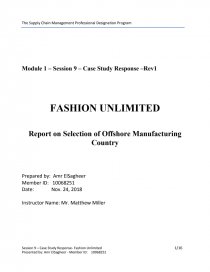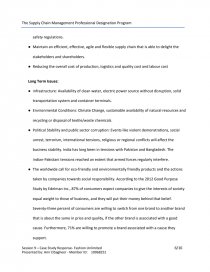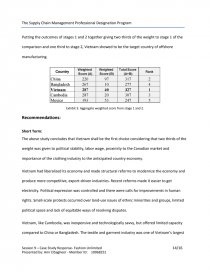Fashion Unlimited - Report on Selection of offshore Manufacturing Country
Essay by Amr Elsagheer • June 25, 2019 • Case Study • 3,567 Words (15 Pages) • 3,363 Views
Essay Preview: Fashion Unlimited - Report on Selection of offshore Manufacturing Country
Module 1 – Session 9 – Case Study Response –Rev1
FASHION UNLIMITED
Report on Selection of Offshore Manufacturing Country
Prepared by: Amr ElSagheer
Member ID: 10068251
Date: Nov. 24, 2018
Instructor Name: Mr. Matthew Miller
INDEX
Executive Summary Page 3
Issues Identification Page 4
Operating Environment Page 7
Root Cause Analysis Page 7
Alternatives Page 9
Recommendations Page 14
Implementation Page 15
Monitor and Control Page 16
Executive Summary:
The trend toward globalization has been driven by trade agreements that elevated competition, not only between businesses, but also between nations. Fashion Unlimited is a Canadian owned and operated clothing manufacturer, with its head office in Toronto and retail operations across the country. It also exports to the United States. Most of its Canadian and US sales were on-line. The company adopts traditional business model into apparel manufacturing with its two seasons, Spring/Summer and Fall/Winter. It makes affordable, current fashions in pants, skirts, tops and outerwear as well as basics (underwear, socks, T-shirts) in a range of colors and sizes, targeting the customer segment ranging in age from 15 to 35. Since its inception.
Since removal of duties under Canada’s Least-Developed Country Tariff program, it became increasingly difficult to manufacture clothing in Canada and remain competitive. Canadian apparel manufacturers shifted their production facility to low cost producing countries and by time it was hard to produce in Canada and remain competitive. By 2018, Fashion Unlimited is forced to re-allocate its value chain activities to maintain sustainable competitiveness. The company also has to penetrate new markets to acquire new customers, minimize its cost, gain competitive position and relief the negative situation in its home country.
A detailed study is conducted across 11 countries in 3 continents targeting to adapt some aspects of the fast fashion model in apparel sector to its traditional business model to improve costs while maintaining the brand quality reputation.
Vietnam is chosen to be the target offshore location which shall maintain low cost of production, sustainable operations and proximity to new customer segments in China and Mexico while preserving a balanced portfolio of risk avoidance and low cost of production.
Vietnam’s textile and garment industry had attracted foreign investment in advance of the Trans- Pacific Partnership (TPP) and the free trade agreement with the EU. The TPP could mean low to zero tariffs on qualifying garment exports. Companies in China, Japan, Hong Kong, South Korea, Taiwan, Austria and Australia had set up new production or expanded current production in Vietnam. Several others, including India, were interested in industry partnerships. The choice of Vietnam shall answer the question of Fashion unlimited executive team.
China and Mexico are chosen to be the next markets to penetrate. Selling in China shall be based on retail store beside the on-line sales. While Mexico shall be targeted for online sales only. A central distribution center is required. In both targeted markets, a 3PL is required to provide the delivery service to the final customers. Fashion Unlimited also has to enhance its IT capabilities to allow electronic data interchange between sites and with the 3PL.
Issues Identification:
Fashion Unlimited is no more able to compete in the Canadian or the United States markets while continuing production in Canada. Competition became intense as many Canadian companies moved production offshore to low labour cost countries. Exports of garments from low labor cost countries raised immensely in the last 15 years. In 2015, exports to Canada from China, Vietnam, Cambodia and Bangladesh resembled around 67% of the overall garments exports to Canada. Running the production activities in Canada in an economically, environmentally and socially responsible manner is no more feasible when there is a lack of domestic skilled cut and sew workers and strict labour laws regarding overtime and wages that put pressure to move towards offshore production.
Fashion Unlimited shall take actions by re-analyzing, assessing and reallocating its value chain activities in order to preserve its position in the market. The short term and long-term issues that it has to be aware of while redefining its strategy are:
Short Term Issues:
- The change in fashion trend from the traditional 2 seasons trend to the modern 52 micro seasons trend. Designing team and their capabilities need to be aligned with such business need.
- The production facility location has to be smartly chosen in order to maintain an on time delivery, proximity to the Canadian market and the long-term targeted market. The location assessment shall also consider how easy it is to establish a business in the target country, availability of resources and utilities.
- The company shall not scarify its reputation whether related to the quality of products or social responsibility by avoiding the reallocation to countries with weak infrastructure and safety regulations.
- Maintain an efficient, effective, agile and flexible supply chain that is able to delight the stakeholders and shareholders.
- Reducing the overall cost of production, logistics and quality cost and labour cost
Long Term Issues:
- Infrastructure: Availability of clean water, electric power source without disruption, solid transportation system and container terminals.
- Environmental Conditions: Climate Change, sustainable availability of natural resources and recycling or disposal of textile/waste chemicals.
- Political Stability and public sector corruption: Events like violent demonstrations, social unrest, terrorism, international tensions, religious or regional conflicts will affect the business stability. India has long been in tensions with Pakistan and Bangladesh. The Indian-Pakistani tensions reached an extent that armed forces regularly interfere.
- The worldwide call for eco-friendly and environmentally friendly products and the actions taken by companies towards social responsibility. According to the 2012 Good Purpose Study by Edelman Inc., 87% of consumers expect companies to give the interests of society equal weight to those of business, and they will put their money behind that belief. Seventy-three percent of consumers are willing to switch from one brand to another brand that is about the same in price and quality, if the other brand is associated with a good cause. Furthermore, 71% are willing to promote a brand associated with a cause they support.
Operating Environment:
Fashion experienced a dramatic change in the last decade. Market players as Zara and Forever 21 introduced new philosophy in the market. Traditionally there were two seasons in the apparel industry, Spring/Summer and Autumn/Winter. Globalization, technological advance especially in emerging economies and free trade agreements elevated the level of competition, where competing companies accelerated their operations and strengthened their supply chains to introduce a new model every week.
...
...
















